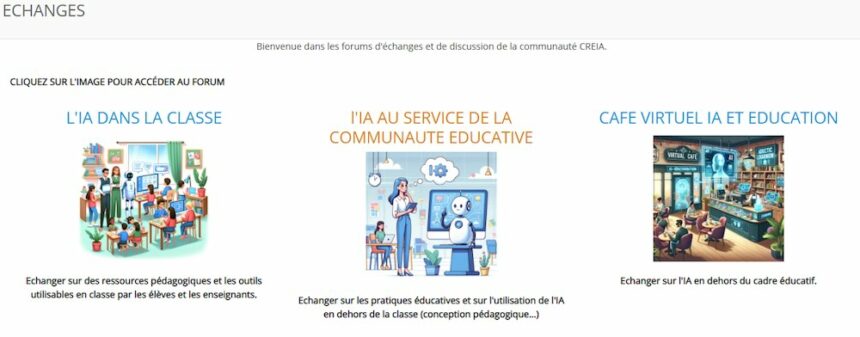🎙️ Interview with Jérémie Coris, project manager overseeing P2IA at the Directorate of Digital Education (DNE), and Clément Fantoli, a technology teacher in the Amiens academy and CREIA project manager at the DNE. If CREIA is new to you, this article, in collaboration with Ludomag, is the perfect introduction!
“Faced with the democratization of AI and a year after ChatGPT became publicly available, the DNE launched CREIA in November 2023 to create a network of trainers” explains Clément Fantoli, tracing the community’s origins.
Initially, the team focused on developing a proposal for the entire educational community. “It took eight months and the collaboration of a network of 170 trainers from all DRANE offices to co-construct the CREIA initiative,” he adds.
CREIA operates on the m@gistère platform (a hub for the entire educational community) and is a proposal designed to be inclusive: “Everyone has a place in CREIA.”
“We provide a space aimed at simplifying user access as much as possible. With the rapid growth of AI, it’s important to offer what we believe is essential,” explains Jérémie Coris.
The m@gistère Space: The Hub for the Educational Community
The m@gistère platform is structured into two levels: the main welcome area leads to subsections containing news, discussions, resources, training, and the shared CREIA calendar. “The 170 trainers can add events like webinars to the calendar,” notes Clément Fantoli.
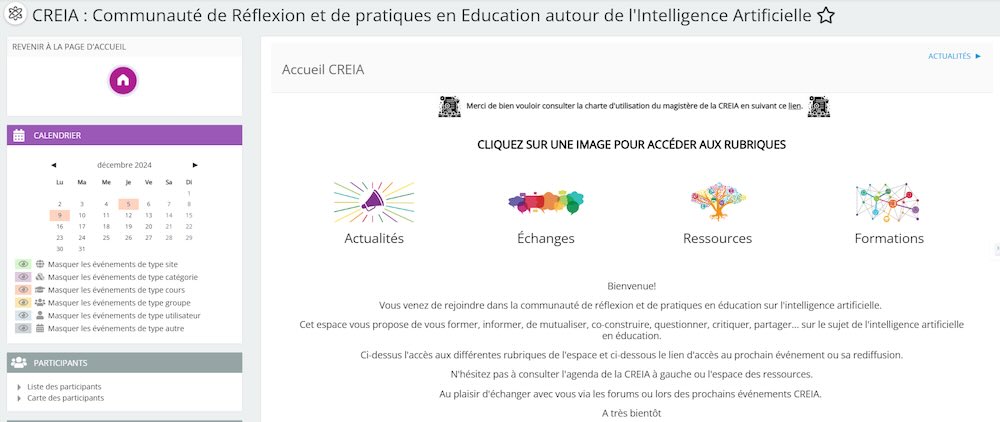
The News tab features twice-daily updates from the DNE via the MUSE app on topics related to AI and education.
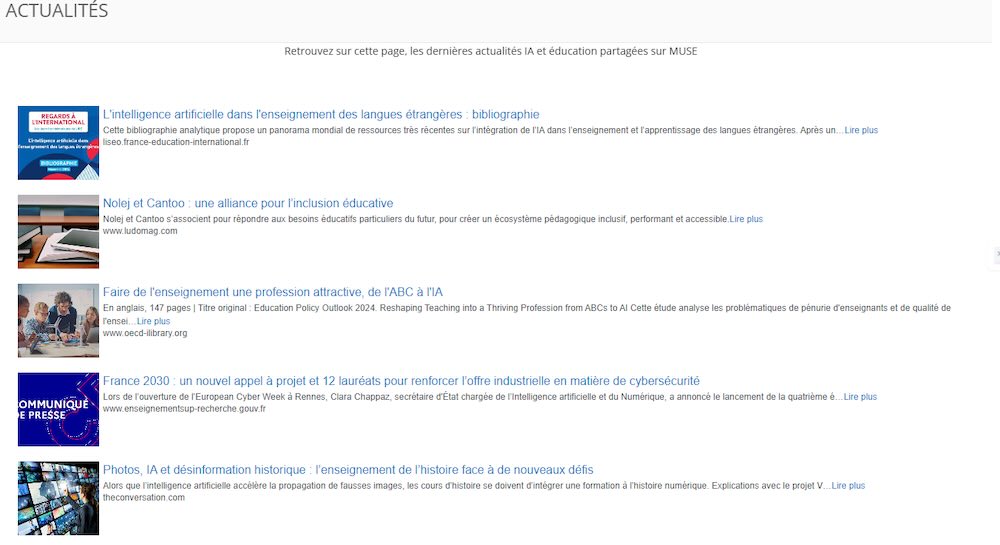
« In CREIA, the most vibrant space is the discussion forums! »
The Success of the Forums
Three forums are available: AI in the Classroom, AI Supporting the Educational Community, and The Virtual Café on AI and Education, “a more informal space for questions outside the scope of the other two forums.”
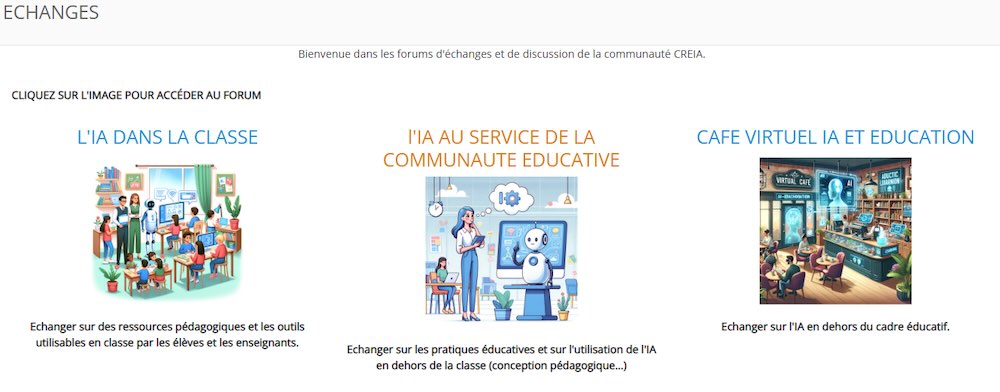
“For us, CREIA is a way to stay connected to the field. When people share their questions and experiences, it allows us to address their needs,” emphasizes Jérémie Coris.
He stresses that CREIA is an evolving initiative.
It’s not a turnkey website where you just pick resources. It’s a tool for the community that must be co-constructed.
“We didn’t anticipate the forums would be so popular, which led us to adjust. For instance, we enabled members to unsubscribe from notifications and introduced newsletters for significant updates.”
Curating, Selecting, and Retiring Resources
The third tab is dedicated to resources. “The challenge with AI is the sheer volume of resources that emerge every hour,” he explains. The trainers’ network is tasked with sorting, validating, and removing outdated materials “to save educators time and avoid overwhelming them with obsolete resources.” For instance, you’ll find the excellent AI4T MOOC developed with European partners.
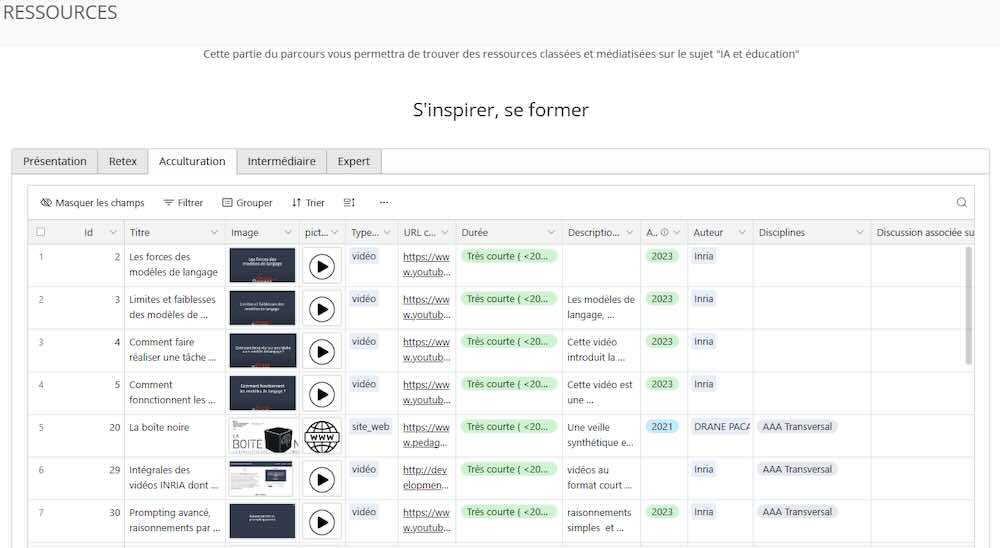
Currently, the « expert » level for resources is empty, as the initial focus is on familiarizing the educational community with these new practices. The Retex (feedback) section compiles experiences on AI, which, along with other resources (webinars, etc.), will soon be translated into other languages to reach a broader European and international audience.
Short-Form Training Modules to Fit Time Constraints
The final section is dedicated to training, leveraging micro-learning principles. Modules rarely exceed 15 minutes to accommodate the realities of educators’ schedules outside school hours. “CREIA is also a learning community,” he points out.
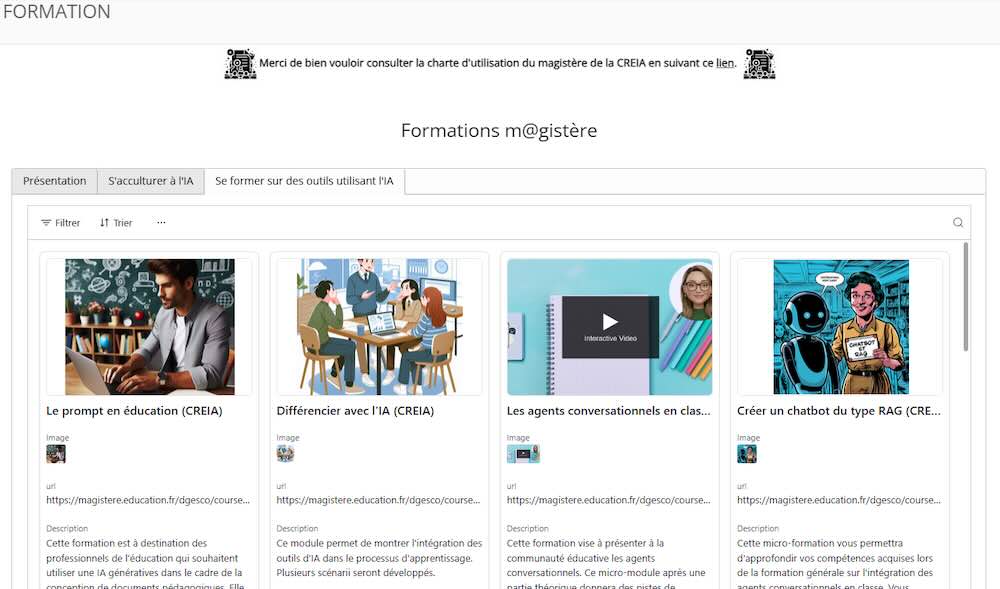
“We realized that to effectively promote AI literacy, we need to equip trainers in academies.”
The training modules can be utilized by field trainers during their sessions.
Breaking the Stigma Around AI in Education
“Through CREIA, we aim to overcome the stigma that teachers delegating repetitive tasks to AI might endanger their profession,” explains Clément Fantoli.
The forums help foster open dialogue and encourage participants to share their insights and observations.
With 2,250 users on CREIA, the abundance of ideas holds great value.
In the coming months, networking projects will take shape. For example, an upcoming webinar will target school principals, led by a principal discussing their AI practices.
“Following the webinar, we’ll establish a working group on AI specifically for principals,” says Clément Fantoli.
“Pooling resources, tools, and expertise is key to this networking vision,” adds Jérémie Coris.
The cornerstone of CREIA’s success lies in encouraging members to share experiences—positive or negative. Clément emphasizes that sharing mistakes fosters learning. Solely showcasing successful case studies from “pioneering” teachers might intimidate others and be counterproductive.
CREIA was created to ask the right questions together, not to promote AI in education.
Clément gives an example of a teacher who expressed opposition to AI in education on the forum, prompting others to join the discussion. “This shows that regardless of your stance on AI, if you’re interested, you’re welcome!”
Jérémie Coris and Clément Fantoli invite you to join the community today, emphasizing that CREIA’s continued evolution depends on everyone’s contributions to ensure AI finds its place in education within an ethical framework.
“When the space is no longer a work in progress, the community will have outlived its purpose,” concludes Clément Fantoli.
In January, CREIA will host AI Month, featuring four DRANE-led events on Wednesday afternoons to prepare the educational community for the AI Summit on February 11, 2025.
For more information, visit: CREIA on m@gistère



